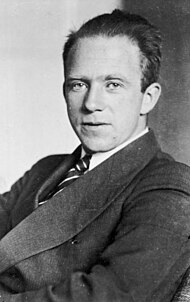
Back Werner Heisenberg Afrikaans Werner Heisenberg ALS Werner Heisenberg AN فيرنر هايزنبيرغ Arabic فيرنر هايزنبيرج ARZ ৱাৰ্নাৰ হাইজেনবাৰ্গ Assamese Werner Heisenberg AST Werner Heisenberg Aymara Verner Heyzenberq Azerbaijani ورنر کارل هایزنبرگ AZB
Werner Karl Heisenberg (pronounced [ˈvɛʁnɐ kaʁl ˈhaɪzn̩bɛʁk] ⓘ; 5 December 1901 – 1 February 1976)[2] was a German theoretical physicist, one of the main pioneers of the theory of quantum mechanics, and a principal scientist in the Nazi nuclear weapons program during World War II. He published his Umdeutung paper in 1925, a major reinterpretation of old quantum theory. In the subsequent series of papers with Max Born and Pascual Jordan, during the same year, his matrix formulation of quantum mechanics was substantially elaborated. He is known for the uncertainty principle, which he published in 1927. Heisenberg was awarded the 1932 Nobel Prize in Physics "for the creation of quantum mechanics".[3][a]
Heisenberg also made contributions to the theories of the hydrodynamics of turbulent flows, the atomic nucleus, ferromagnetism, cosmic rays, and subatomic particles. He was also instrumental in planning the first West German nuclear reactor at Karlsruhe, together with a research reactor in Munich, in 1957.
Following World War II, he was appointed director of the Kaiser Wilhelm Institute for Physics, which soon thereafter was renamed the Max Planck Institute for Physics. He was director of the institute until it was moved to Munich in 1958. He then became director of the Max Planck Institute for Physics and Astrophysics from 1960 to 1970.
Heisenberg was also president of the German Research Council,[4] chairman of the Commission for Atomic Physics, chairman of the Nuclear Physics Working Group, and president of the Alexander von Humboldt Foundation.[1]
- ^ a b Cite error: The named reference
formemrswas invoked but never defined (see the help page). - ^ Cite error: The named reference
Biographywas invoked but never defined (see the help page). - ^ Werner Heisenberg on Nobelprize.org This source explains that Heisenberg actually received his Nobel Prize for 1932 one year later, in 1933.
- ^ "Reviving German Science". American Institute of Physics.
Cite error: There are <ref group=lower-alpha> tags or {{efn}} templates on this page, but the references will not show without a {{reflist|group=lower-alpha}} template or {{notelist}} template (see the help page).
© MMXXIII Rich X Search. We shall prevail. All rights reserved. Rich X Search
